
Industrial acacia plantation for pulp production.
Asia Pulp & Paper (APP) has established a moratorium on natural forest conversion in Jambi province on the island of Sumatra, according to a report issued by the Indonesian forestry giant.
The moratorium covers 55,584 hectares of forest land, including concessions owned outright by APP and two independent pulpwood suppliers. APP says it has now conducted a preliminary high conservation value forest (HCVF) assessment across 80 percent of its concessions in Jambi and Riau and 50 percent of its concessions in West Kalimantan. APP and its affiliates own about 1 million hectares of forest concessions, while its suppliers control 1.5 million ha.
The “sustainability roadmap” comes as part of APP’s effort to phase out sourcing of fiber from natural forests by 2015. The target applies only to APP-owned forest concessions, although suppliers are expected to conduct HCVF assessments on their holdings by the same year.
 |
The initiatives are a response to criticism from environmental groups over APP’s forest management practices. According to groups ranging from WWF to the Rainforest Alliance to Greenpeace, APP has converted vast areas of tropical forest and peatlands for acacia and eucalyptus plantations to feed its pulp mills. WWF estimates that APP and its suppliers have destroyed 2 million hectares of forest in Sumatra since 1984, including critical habitat for endangered tigers, elephants, orangutans, and rhinos. Conversion has also driven substantial greenhouse gas emissions. By one estimate, carbon dioxide emissions from the Indonesian pulp and paper industry amount to 600 million tons per year, or more than the total emissions from deforestation in the Brazilian Amazon.
Complaints from environmental groups have hit APP hard. Greenpeace’s campaign has been particularly damaging, costing APP dozens of major customers — including Xerox, Kraft, National Geographic, Mattel, and Carrefour, among others — in recent years. WWF has also issued a series of reports showing that APP has failed to abide by three past targets for phasing out natural forest logging and that the paper giant’s “conservation initiatives” are little more that compliance with Indonesian law. One of these prior commitments was to conserve HCVF as specified under the Rainforest Alliance’s SmartWood program. APP breached that pledge in 2005 and 2006, leading Rainforest Alliance to terminate the agreement with APP in 2007. The Forest Stewardship Council (FSC) subsequently ended its relationship with APP.
Given this checkered record, Greenpeace greeted APP’s newest announcement with skepticism.
“APP’s announcement to suspend all natural forest clearance in Jambi is a step forward,” a Greenpeace spokesperson told mongabay.com is email. “However, if APP is to prove it is genuinely committed to ending its involvement in deforestation this same commitment must be immediately applied to all areas of natural forest in Indonesia from where it’s sourcing.”
Greenpeace also expressed concern about a new pulp mill allegedly linked to APP’s parent, the Sinar Mas group of companies.
“The news that APP plans to develop a massive new pulp mill in South Sumatra raises serious questions about recent claims that the company plans to stop using timber from natural forest clearance.”
APP has denied any involvement with the new pulp mill and Sinar Mas has not confirmed media reports that it is linked to the project. But analysis by Christopher Barr, a forestry consultant, raises doubts that there are enough plantations to meet the new mill’s demand. Any shortfall would likely come from natural forests. (APP’s 2015 target allows for 5 percent of its fiber to come from natural forests).
“Typically investments in pulp capacity occur well ahead of plantations,” Barr said.
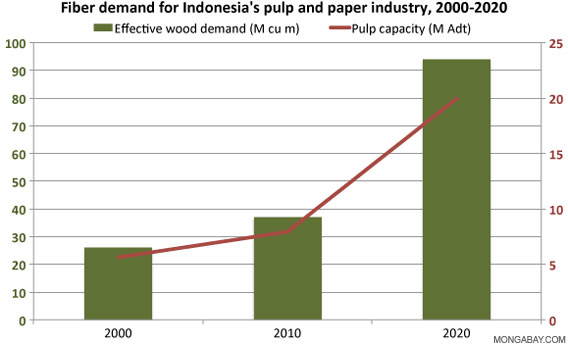
Past and forecast demand and production targets for Indonesia’s pulp and paper industry.
Indonesia is gearing up for substantial pulp and paper expansion by 2020. Although Indonesian President Susilo Bambang Yudhoyono in 2011 established a moratorium on new forestry concessions across 14.5 million hectares of peatlands and primary forest through 2013, the Ministry of Forestry has since expanded the area zoned for industrial timber plantations from 9.4 million ha to 21.2 million hectares. The targets make it difficult to believe that Indonesia will be able to meet its emissions reduction target for 2020, according to Barr.
“I have a hard time envisioning this capacity expansion while reducing emissions,” said Barr.
But APP maintains it “is committed to an all-plantation business model”. The question from environmentalists remains whether these plantations will be established by converting native forests.
Related articles
Indonesia’s pulp and paper targets incompatible with green growth goals

(08/10/2012) Indonesia’s pulp and paper targets incompatible with green growth goals Indonesia’s ambitious targets for boosting pulp and paper production to make it the world’s lowest-cost producer are at odds with its push for green economic growth should expansion proceed on its current business-as-usual path, said a forestry expert presenting at the annual meeting of the Association for Tropical Biology and Conservation (ATBC) in Bonito, Brazil.
APP’s new ‘sustainability roadmap’ won’t spare unprotected tiger habitat in Sumatra
(07/27/2012) Asia Pulp & Paper’s new sustainability commitment represents a scaling back of earlier environmental pledges and does not offer new protection for natural forests in Sumatra, alleges a new report from Eyes on the Forest, a coalition of green groups based in Riau, Sumatra.
Another red herring from Asia Pulp & Paper on its deforestation problem

(05/29/2012) In a press release issued last Thursday, Asia Pulp & Paper (APP) asserted that the presence of mixed tropical hardwood fiber (MTH) in its products ‘does not come from the felling of virgin tropical rainforest trees in Indonesia’. The embattled paper giant goes on to say that ‘the presence of MTH fiber says nothing about whether the product is sustainable or not” and that “MTH can be found easily in recycled paper.’ All these points are true. But what APP doesn’t tell you is that its response is yet another facade in its effort to deflect criticism from its forestry practices.
Ongoing deforestation puts APP in breach of debt restructuring agreements, finds report
(03/27/2012) Asia Pulp & Paper (APP) has broken “legally binding” debt restructuring agreements by continuing to clear native forests in Sumatra, alleges a new report from Eyes on the Forest, a coalition of Indonesian environmental groups.
Investigation links APP to illegal logging of protected trees

(03/01/2012) A year-long undercover investigation has found evidence of Asia Pulp and Paper (APP) companies cutting and pulping legally protected ramin trees, a practice that violates both Indonesian and international law. Found largely in Sumatra’s peatswamp forests, the logging of ramin trees (in the genus Gonystylus) has been banned in Indonesia since 2001; the trees are also listed under Appendix II of the Convention on International Trade in Endangered Species (CITES) and thus require special permits to export. The new allegations come after APP, an umbrella paper brand, has lost several customers due to its continued reliance on pulp from rainforest and peatland forests in Sumatra.
Paper giant hammered on forest certification claims
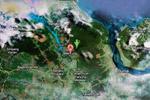
(02/15/2012) Beleaguered paper giant Asia Pulp & Paper was sharply criticized Wednesday for its claims that its operations are certified sustainable by independent auditors. WWF said its survey of certifiers and certification schemes shows that none apply to ‘the most controversial operations’ of APP’s suppliers: clearing of rainforests and peatlands that are home to endangered tigers, elephants, and orangutans. In responding to complaints from environmentalists that its operations are responsible for large-scale destruction of native forests, APP often touts various certification standards which it says demonstrate its commitment to sustainability. Yet the new WWF survey found that these standards don’t apply across all of the paper giant’s operations — APP’s suppliers in Indonesia continue to harvest and convert natural forests. Nor do the certification standards necessarily prove that APP’s forest management practices are ‘sustainable’.
New analysis supports claim that paper giant cleared part of its tiger sanctuary in Indonesia
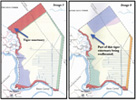
(12/21/2011) Asia Pulp & Paper (APP)’s supplier PT Ruas Utama Jaya has indeed cleared an area of forest it pledged to set aside as a tiger conservation reserve in Sumatra reports a legal analysis by Greenomics, an Indonesian environmental group. The Greenomics’ analysis supports allegations originally set forth in a report published last week by Eyes of the Forest, a coalition of green groups, and seems to refute a press release issued by APP that called the deforestation allegations ‘fiction’.
WWF: Asia Pulp & Paper misleads public about its role in destroying Indonesia’s rainforests
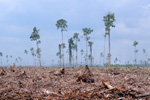
(12/16/2011) Asia Pulp & Paper (APP) continues to mislead the public about its role in destroying rainforests and critical tiger habitat across the Indonesian island of Sumatra, alleges a new report from Eyes on the Forest, a coalition of Indonesian environmental groups including WWF-Indonesia. The report, titled The truth behind APP’s Greenwash, is based on analysis of satellite imagery as well as public and private documentation of forest cleared by logging companies that supply APP, which is owned by the Indonesian conglomerate, Sinar Mas Group (SMG). The report concludes APP’s fiber suppliers have destroyed 2 million hectares of forest in Sumatra since 1984.
Paper commitments for the Indonesian industry

(12/13/2011) The Indonesian group Asia Pulp & Paper (APP) has been the target of many NGOs for years due to its alleged negative impacts on tropical forests. This culminated in a spectacular campaign launched by Greenpeace in 2011 based on Ken “dumping” Barbie. The rationale was that toy brand Mattel was accused of using APP paper products linked to the clear-cutting of natural forests in the Indonesian archipelago. APP organized a counter-attack in the media with the daily publication of advertisements promoting its sustainable development practices. Journalists from all over the world were also invited to attend guided tours of APP concessions to demonstrate their conservation efforts, and a number of articles were subsequently written.
Report questions legitimacy of Asia Pulp & Paper’s conservation initiatives
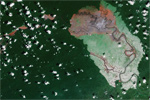
(11/22/2011) A new report by an Indonesian environmental group casts doubt on Asia Pulp & Paper’s commitment to sustainability. In its corporate social responsibility reports and advertisements, Asia Pulp & Paper (APP), one of Indonesia’s largest pulp and paper suppliers, has touted several forest reserves as indicators of its commitment to environmental stewardship. APP has portrayed these as voluntary, goodwill efforts to conserve Sumatra’s endangered wildlife. But in a new report, Greenomics-Indonesia, a Jakarta-based NGO, says that at best these projects represent compliance with existing Indonesian laws or are in areas where commercial exploitation isn’t viable.
War of words between Greenpeace, Asia Pulp & Paper over deforestation allegations

(11/16/2011) Greenpeace and Asia Pulp & Paper (APP), a giant global paper supplier, are locked in a heated battle over the activist group’s allegations that APP products contain fiber sourced from the destruction of forests in Indonesia. At stake is APP’s access to some of the world’s most lucrative markets. Until APP provides solid evidence refuting Greenpeace’s accusation that its pulp and paper production isn’t coming at the expense of natural forests in Indonesia, APP will have a difficult time winning over critics.
7 conglomerates control 9M ha of land in Indonesia
(05/05/2011) Efforts to slow deforestation in Indonesia should include curtailing further expansion of forestry holdings by giant conglomerates, says an Indonesian activist group. Analyzing data from the Ministry of Forest’s Production Forest Utilization Quarterly Report, Jakarta-based Greenomics-Indonesia found that seven conglomerates in Indonesia control more than 9 million hectares of land, including large forest concessions that will likely be exempt from any moratorium on forest clearing established under the country’s Reducing Emissions from Deforestation and Degradation (REDD) program. The extent of holdings could complicate Indonesia’s efforts to reduce emissions from logging and plantation development.
Pulp and paper firms urged to save 1.2M ha of forest slated for clearing in Indonesia
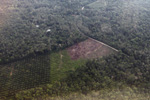
(03/17/2011) Indonesian environmental groups launched a urgent plea urging the country’s two largest pulp and paper companies not to clear 800,000 hectares of forest and peatland in their concessions in Sumatra. Eyes on the Forest, a coalition of Indonesian NGOs, released maps showing that Asia Pulp and Paper (APP) and Asia Pacific Resources International Limited (APRIL) control blocks of land representing 31 percent of the remaining forest in the province of Riau, one of Sumatra’s most forested provinces. Much of the forest lies on deep peat, which releases large of amount of carbon when drained and cleared for timber plantations.
Does chopping down rainforests for pulp and paper help alleviate poverty in Indonesia?

(01/13/2011) Over the past several years, Asia Pulp & Paper has engaged in a marketing campaign to represent its operations in Sumatra as socially and environmentally sustainable. APP and its agents maintain that industrial pulp and paper production — as practiced in Sumatra — does not result in deforestation, is carbon neutral, helps protect wildlife, and alleviates poverty. While a series of analyses and reports have shown most of these assertions to be false, the final claim has largely not been contested. But is conversion of lowland rainforests for pulp and paper really in Indonesia’s best economic interest?